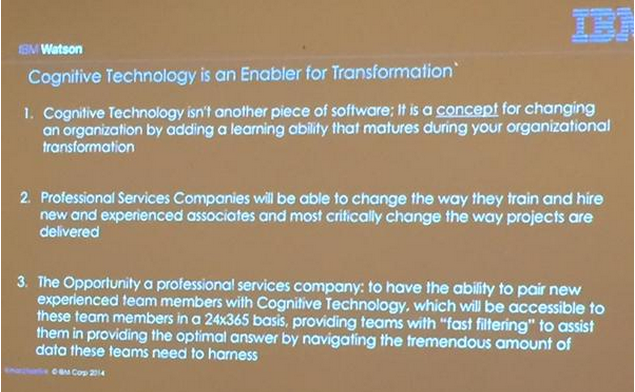This is a live blog post from the 2014 ITA Collaborative Conference. Presenting is Marc Teerlink, Chief Business Strategist of IBM’s Watson Group. (Please excuse typos and typos.)
Seven Principles:
- Disruption. It’s all about letting go. Why are we wed to all ways of work, for example, QWERY keyboard or electric cars that move if you foot is not on the brake?
- Data Overload. We don’t have too much data; we have filter failure. Cites daughter who says about Google search, “second pages is for losers” but Mark points out that this way of thinking often leads to losing context and the big picture. Search engines lack context and ability to understand what we really mean. Computers have trouble with langague. Examples “Noses run and Feet smell”. “Paris Hilton is not the Paris Hilton”.
- Millennials are transforming our industries. Change happens from the bottom up with a younger generation.
- Expertise is the most valuable asset for an organization. “The world’s progress is driven by expertise.” Cognition is observe, interpret and evaluate, and then decide. People develop expertise over time with much studying, apprenticing, practicing, and then eventually becoming a master by dint of years of experience. Mark asks if we can accelerate and enhance expertise acquisition. And then scale this process.
Watson scales expertise. Start with knowledgeable expert (“when can I upgrade my subscription”), go to empowered agent (“can you help me select the right product”), and then to personal advisor (“oh, I hand’t thought about that level of service.” Asks can we push knowledge down to lower levels. - Cognitive Technology will lead the next wave of Disruption. CEO required, in forming Watson group, required building an ecosystem and content. This must be delivered in 2015. Cognitive tech does not have a database – it learns over time.
Why did IBM want to play Jeopardy? Show the ability to rival human ability to answer questions in a situation with very trick language and where players have to strategize about not just answers, but how they play (eg, double jeopardy).
“Cognition is the mental action or process of acquiring knowledge and understanding through thought, experience, and the senses.”
Points out that both human memory and many public sources are not always reliable.
“The core of Watson is a learning system that works by understanding both customers and knowledge.”
Cognitive tech is different because it understands natural language, evaluates hypos, adapts and learns. Reasons, explores, visualizse. Sees, hears, experiences. - Orchestration: Ask, discover, decide, visualize, analyze. Use case driven apps require that different analytics services work together – the output of one is the input to the other.
At Memorial Sloan Kettering, IBM Watson has ingested 25,000 documented patient cases. These include intake forms, bedside notes by nurses, test results, and more.
All answers can show how the answer was derived.
Treatment plans come with confidence ratings and acceptability rating based on patient preferences.
Watson can take new information, eg new symptoms, and revise its results.
Cites other Watson examples, including recipe builder / advisor, and personal travel planner. - Growth and comfort do not co-exist.
What makes a great cognitive use case. Start by asking 3 questions: what is the biz value, does the app draw on unique capabilities of cognitive app, and has the content that will feul it been identified and can it be secured or licensed for its intended use.
The best use case: a Q&A requirement with the question in natural language; seek answer and insight from a defined data repository.
To close presentation, portion, a discussion of IBM Watson for professional services. Here is a summary slide of this point:
Q&A not captured.
[End Note: For more on Legal Watson, see my August 2014 post, Meet Your New Lawyer, IBM Watson in which, based on the limited information then available, I point out challenges to creating legal IBM Watson.]
Archives
Blog Categories
- Alternative Legal Provider (44)
- Artificial Intelligence (AI) (57)
- Bar Regulation (13)
- Best Practices (39)
- Big Data and Data Science (14)
- Blockchain (10)
- Bloomberg Biz of Law Summit – Live (6)
- Business Intelligence (21)
- Contract Management (21)
- Cool Legal Conferences (13)
- COVID-19 (11)
- Design (5)
- Do Less Law (40)
- eDiscovery and Litigation Support (165)
- Experience Management (12)
- Extranets (11)
- General (194)
- Innovation and Change Management (188)
- Interesting Technology (105)
- Knowledge Management (229)
- Law Department Management (20)
- Law Departments / Client Service (120)
- Law Factory v. Bet the Farm (30)
- Law Firm Service Delivery (128)
- Law Firm Staffing (27)
- Law Libraries (6)
- Legal market survey featured (6)
- Legal Process Improvement (27)
- Legal Project Management (26)
- Legal Secretaries – Their Future (17)
- Legal Tech Start-Ups (18)
- Litigation Finance (5)
- Low Cost Law Firm Centers (22)
- Management and Technology (179)
- Notices re this Blog (10)
- Online Legal Services (64)
- Outsourcing (141)
- Personal Productivity (40)
- Roundup (58)
- Structure of Legal Business (2)
- Supplier News (13)
- Visual Intelligence (14)

